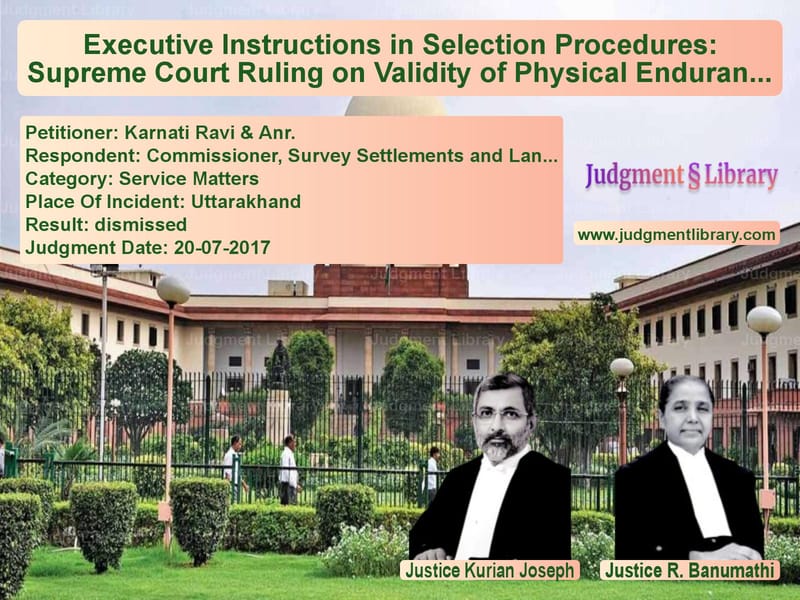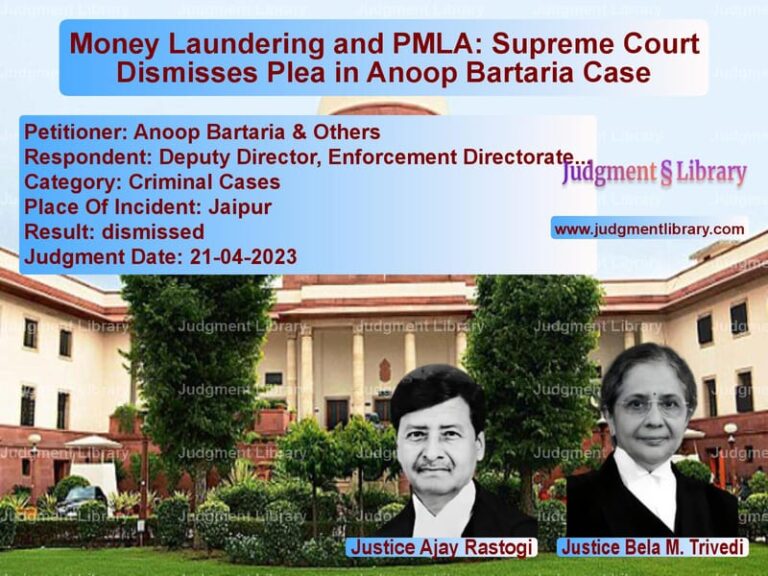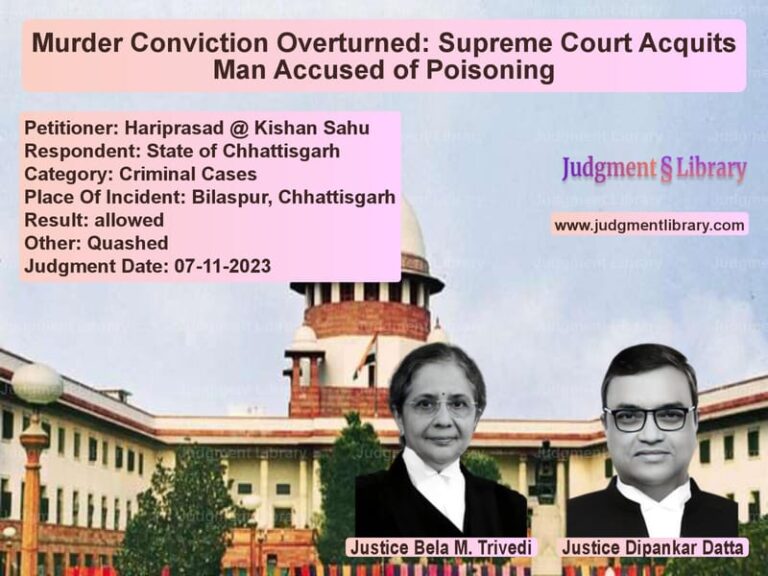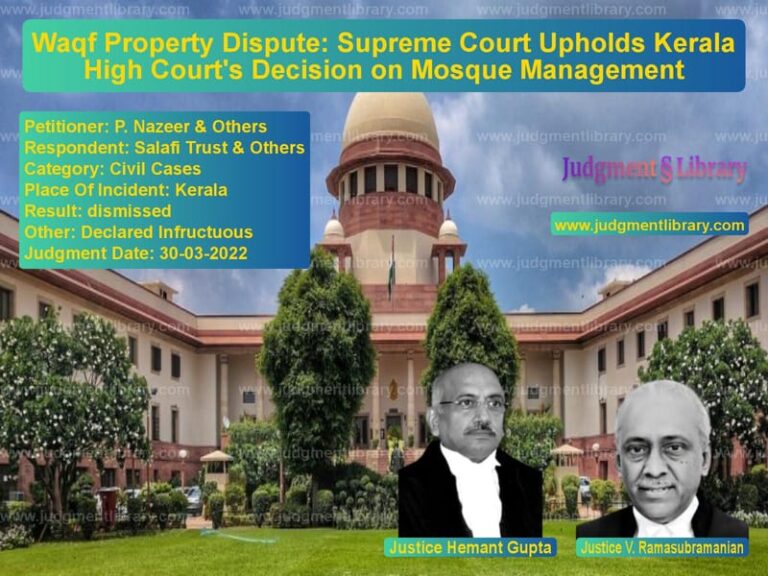Executive Instructions in Selection Procedures: Supreme Court Ruling on Validity of Physical Endurance Test
The case of Karnati Ravi & Anr. vs. Commissioner, Survey Settlements and Land Records & Ors. involves a challenge to the selection procedure for the position of Deputy Surveyor, specifically the imposition of a physical endurance test as part of the selection process. The appellants, who participated in the selection process, questioned the validity of the physical endurance test, arguing that it was not prescribed under the relevant rules, unlike the physical tests required for the position of Police Constable.
The issue in this case primarily revolves around whether executive instructions, in the absence of formal rules, can determine the procedures for recruitment, including physical endurance tests. The Supreme Court had to decide whether the executive instructions, which introduced the physical endurance test, were valid and enforceable.
Background of the Case
The appellants, Karnati Ravi and another, participated in a recruitment process for the position of Deputy Surveyor. The relevant rules for the post did not specify the procedure for selection, including whether a physical endurance test was required. In the absence of such rules, the selection was governed by executive instructions that mandated a written test and a physical endurance test for the candidates.
The appellants had no objections to the written examination but raised concerns regarding the physical endurance test, arguing that it was not part of the prescribed procedure for the selection of a Deputy Surveyor. After undergoing the physical test, the appellants were disqualified as they failed to meet the physical endurance requirements. They subsequently challenged the validity of these executive instructions that introduced the physical endurance test.
Petitioners’ Arguments
The appellants, represented by their legal counsel, presented the following arguments:
- The physical endurance test was not a prescribed part of the selection process for Deputy Surveyors under the applicable rules, unlike the procedure for Police Constables.
- The introduction of the physical endurance test via executive instructions was arbitrary and outside the scope of executive power, as it was not authorized by any governing rules.
- While the written test was conducted, there was no legal basis for the imposition of the physical endurance test, especially since it was not stipulated in the rules for Deputy Surveyor appointments.
- The appellants argued that the executive instructions overstepped the boundary of lawful administrative action and affected their chances unfairly.
Respondents’ Arguments
The respondents, represented by the Union of India and the relevant administrative bodies, argued:
- The absence of specific rules for the Deputy Surveyor selection did not preclude the introduction of necessary procedures through executive instructions.
- Under Article 162 of the Constitution, the executive has the authority to make regulations regarding the procedure of selection when there are no prescribed rules.
- All candidates, including the appellants, participated in both the written test and the physical endurance test. Therefore, they had no grounds to challenge the procedure after having voluntarily accepted it.
- The physical endurance test was a reasonable and necessary requirement for the position of Deputy Surveyor, ensuring that candidates were physically capable of performing the job requirements.
Supreme Court’s Observations and Judgment
The Supreme Court, in its judgment delivered by Justice Kurian Joseph, dismissed the appeal, stating the following key observations:
- “The procedure for selection, in the absence of rules, can be determined by executive instructions. This is within the scope of the executive’s power under Article 162 of the Constitution.”
- The Court held that while the physical endurance test was not explicitly outlined in the rules, the introduction of such a test through executive instructions was permissible when there were no prescribed selection rules for the post.
- “In the absence of specific rules, it is within the powers of the executive to introduce requirements such as a physical endurance test, provided it does not conflict with existing regulations.”
- The appellants had voluntarily participated in both the written test and the physical test without objection, and they could not later challenge the selection procedure after the fact.
- Having participated in the process and failed the physical endurance test, the appellants could not claim that the procedure was unlawful.
The Court concluded that there was no merit in the appeals and dismissed them, affirming that executive instructions regarding the selection process were valid in the absence of formal rules.
Key Legal Takeaways
The Supreme Court’s ruling establishes several important legal principles:
- Executive Power in the Absence of Rules: In the absence of specific rules governing a selection process, the executive can introduce necessary procedures, including tests such as the physical endurance test.
- Article 162 of the Constitution: Executive instructions can provide details regarding procedures for recruitment, as long as they do not conflict with the overarching legal framework.
- Participation Implies Acceptance: Candidates who participate in a selection process, including any tests introduced by executive instructions, cannot later challenge the procedure if they fail the tests.
- Judicial Deference to Executive Instructions: The Court reiterated that the judiciary would not interfere with executive decisions regarding selection procedures unless they are in direct violation of existing rules or laws.
Impact of the Judgment
The ruling has several implications for future recruitment and selection processes:
- Government agencies and bodies have the authority to set selection criteria through executive instructions when formal rules do not exist.
- Applicants in future selection processes must be vigilant about any additional tests or requirements introduced through executive orders and cannot later challenge them if they fail.
- The judgment emphasizes the need for clarity and transparency in recruitment procedures to ensure that candidates are aware of the selection criteria from the outset.
Conclusion
The Supreme Court’s decision in Karnati Ravi & Anr. vs. Commissioner, Survey Settlements and Land Records & Ors. clarifies the scope of executive power in determining recruitment procedures in the absence of specific rules. By upholding the validity of the physical endurance test introduced through executive instructions, the Court reinforced the executive’s discretion to regulate selection processes in the absence of detailed rules.
This ruling ensures that recruitment procedures can be adaptable and responsive to the needs of the organization, while also emphasizing the importance of transparency and fairness in such processes.
Don’t miss out on the full details! Download the complete judgment in PDF format below and gain valuable insights instantly!
Download Judgment: Karnati Ravi & Anr. vs Commissioner, Survey Supreme Court of India Judgment Dated 20-07-2017.pdf
Direct Downlaod Judgment: Direct downlaod this Judgment
See all petitions in Employment Disputes
See all petitions in Promotion Cases
See all petitions in Public Sector Employees
See all petitions in Judgment by Kurian Joseph
See all petitions in Judgment by R. Banumathi
See all petitions in dismissed
See all petitions in supreme court of India judgments July 2017
See all petitions in 2017 judgments
See all posts in Service Matters Category
See all allowed petitions in Service Matters Category
See all Dismissed petitions in Service Matters Category
See all partially allowed petitions in Service Matters Category







